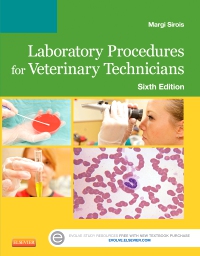
Laboratory Procedures for Veterinary Technicians - Elsevier eBook on VitalSource, 6th Edition
Elsevier eBook on VitalSource

Now $78.84
Now in full color with hundreds of new images, Laboratory Procedures for Veterinary Technicians, 6th Edition covers the broad spectrum of laboratory procedures that veterinary technicians need to perform effectively in the practice setting. Comprehensive content presents the fundamentals of microbiology, hematology, urinalysis, immunology, and cytology, along with the laboratory procedures used to perform the most widely used tests such as complete blood count, urinalysis, and immunologic assays. This edition includes newly organized chapters with expanded coverage of essential material to prepare you for real-life laboratory work.
"Everything you would expect from an in- house lab is listed here." Reviewed by Fabienne Dethioux on behalf of Vet Nurses Today, March 2015
-
- Clearly presents the fundamentals of microbiology, hematology, urinalysis, immunology, parasitology, and cytology along with the laboratory procedures used to perform tests in these fields.
- Features the latest information on the most widely used tests, including complete blood count, urinalysis, and immunology assays.
- Features step-by-step procedure boxes, for quick mastery of essential skills.
- Extensive full-color illustrations enhance descriptions of normal and abnormal findings.
-
- NEW! Streamlined chapters are shorter and easier to digest with expanded coverage of essential material to prepare you for real-life laboratory work.
- NEW! Full-color photos bring concepts to life, sequentially arranged to illustrate step-by-step procedures for all commonly performed diagnostic tests in the clinical laboratory.
- NEW! Companion Lab Manual (sold separately) includes multiple-choice questions, fill-in-the-blank exercises, photo quizzes, labeling exercises, crossword puzzles, and other activities to help you master and apply key concepts and procedures in clinical situations.
- NEW! Special emphasis on the significance of abnormal results of key lab tests, zoonoses, and hematology.
- NEW! Vet Tech Threads provide you with introductions, suggested readings, boxed technician notes, learning objectives, chapter outlines, key terms, and a glossary for easy navigation through chapters and more focused learning.
-
UNIT 1: THE VETERINARY PRACTICE LABORATORY
1. Safety and OSHA Standards
2. General Laboratory Equipment
3. The Microscope
4. The Metric System and Lab Calculations
5. Quality Control and Record KeepingUNIT 2: HEMATOLOGY
6. Hematopoeisis
7. Sample Collection and Handling
8. Automated Analyzers
9. Hemoglobin, PCV, and Erythrocyte Indices
10. Evaluating the Blood Film
11. Morphologic Abnormalities of Blood Cells
12. Additional Hematologic Tests
13. Hematopoeitic Disorders and Classification of AnemiaUNIT 3: HEMOSTASIS
14. Principles of Blood Coagulation
15. Sample Collection and Handling
16. Platelet Evaluation
17. Coagulation Testing
18. Disorders of HemostasisUNIT 4: IMMUNOLOGY
19. Basic Principles of Immunology
20. Common Tests Performed in the In-House Testing
21. Blood Groups and Immunity
22. Intradermal Testing
23. Reference Laboratory Tests
24. Disorders of the Immune SystemUNIT 5: URINALYSIS
25. Anatomy and Physiology of the Urinary System
26. Sample Collection and Handling
27. Physical Examination of Urine
28. Chemical Evaluation
29. Urine Sediment AnalysisUNIT 6: CLINICAL CHEMISTRY
30. Sample Collection and Handling
31. Automated Analyzers
32. Protein Assays and Hepatobiliary Function Tests
33. Kidney Function Tests
34. Pancreatic Function Tests
35. Electrolyte and Acid-Base Status
36. Miscellaneous TestsUNIT 7: MICROBIOLOGY
37. Introduction to Microbiology
38. Equipment and Supplies
39. Sample Collection and Handling
40. Staining Specimens
41. Culture Techniques
42. Antimicrobial Sensitivity Testing
43. Additional Testing
44. MycologyUNIT 8: PARASITOLOGY
45. Nematodes
46. Cestodes, Trematodes, and Acantocephelans
47. Protozoa and Rickettsia
48. Arthropods
49. Sample Collection and Handling
50. Diagnostic TechniquesUNIT 9: CYTOLOGY
51. Sample Collection and Handling
52. Preparation of Cytology Smears
53. Microscopic Evaluation
54. Cytology of Specific SitesAppendix A: Reference Ranges
Appendix B: Bacterial Pathogens of Veterinary Importance
Appendix C: Professional Associations Related to Veterinary Clinical Laboratory Diagnostics
Appendix D: Common Parasites of Some Exotic Animal Species

 as described in our
as described in our 